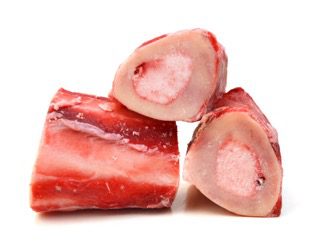

Bone marrow is a popular food among dog owners, and for good reason. This nutrient-dense food is known to promote healthy skin, coat, and joints due to its high collagen, glucosamine, and glycine content. Commonly referred to as “soup bones,” marrow bones are the large bones filled with soft, fatty tissue found in beef, lamb, and other animals.
Bone marrow is a rich source of health-promoting compounds such as collagen, glucosamine, glycine, and conjugated linoleic acid. These compounds can help reduce inflammation in joints and promote skin health.
Excessive consumption of bone marrow can lead to weight gain and obesity in dogs due to its high calorie and fat content. It may also cause diarrhea and worsen pancreatic conditions. Bone marrow may also cause constipation and the bone itself can get stuck in the dog’s jaw or teeth. Additionally, bacteria may be present if sourced from an unreliable supplier.
It is recommended to give marrow bones to your dog once a week, with the size of the bones depending on the age, size, and breed of your dog. Always supervise your dog when feeding marrow bones to prevent accidents. For dogs not on a raw diet or with sensitive stomachs, bone broth is a good alternative. Cooked bones should never be given to dogs. Store the bone in a sealed container in the fridge between chewing sessions and discard it once the marrow is eaten and the bone starts to dry. If your dog has pancreatitis, consult with your veterinarian before feeding them bone marrow.
Moderation is key when it comes to feeding bone marrow to dogs. While it is generally safe and even beneficial for their health, overindulgence can lead to obesity. Bone marrow contains collagen, glucosamine, and other nutrients that promote healthy skin, coat, and joints.
While moderate consumption of bone marrow can be highly beneficial for dogs, overindulgence can lead to obesity and other health problems. It is also important to source the bones from a reputable supplier to ensure the absence of harmful bacteria.
If you choose to feed your dog marrow bones, it is recommended to do so once a week, with the size of the bones tailored to your dog's age, size, and breed. To prevent accidents, always supervise your dog when feeding them any type of bone. It is important to note that cooked bones should never be given to dogs, as they can splinter and cause serious health issues.
If you're looking for an alternative to marrow bones, bone broth is a nutritious and safe option for dogs not on a raw diet or with sensitive stomachs. However, if your dog has pancreatitis, consult with your veterinarian before feeding them bone marrow.
Have you tried feeding your dog bone marrow? How did they react to it? Remember to always prioritize moderation and consult with your veterinarian about any concerns related to your dog's diet.